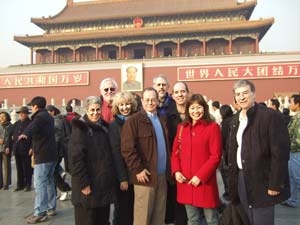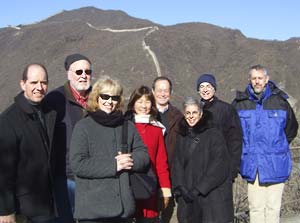

Venture Boldly

Office of Communications
2 East South Street
Galesburg, IL 61401

Eight Knox College faculty members visited China last month and brought back plans to add China-related enhancements to their teaching and research activities.
Leading the expedition were the co-directors of the Center for Global Studies at Knox -- Michael Schneider, associate professor of history, and Robert Seibert, Robert W. Murphy Professor of Political Science. Other faculty members were David Amor, instructor in anthropology-sociology; Diana Beck, associate professor of educational studies; Steve Cohn, professor of economics; Penny Gold, professor of history; Charles Schulz, professor of physics; and Shuyan Shipplett, lecturer in modern languages.
The trip was sponsored by the Center for Global Studies at Knox College, through a grant to the Center from the Caterpillar Foundation.
Prior to the trip, the faculty members participated in a ten-week seminar and language instruction. They also developed proposals to incorporate their experiences in China into their work at Knox.
The group spent most of its time in three cities -- Beijing, Xi'an and Shanghai.
"Of course, we went to sites like Tiananmen Square and the Great Wall -- these are the 'must-sees' for tourists and academics alike," Schneider said. "Understanding these popular sites in a broad historical and social context is central to our academic mission."
The group visited universities in Beijing and Shanghai. "We made excellent contacts with educational institutions that can receive both our students and our faculty," Schneider said. "These connections will pay a huge benefit to Knox students seeking study-abroad experiences in China."
Seibert gave invited lectures to graduate students and faculty in public policy institutes at two Chinese universities -- Renmin University in Beijing and Fudan University in Shanghai.
The Knox delegation received a briefing at the United States embassy in Beijing, arranged by Charles Chandler, a 1997 Knox graduate who works for the U.S. State Department in China.
"We also were helped by Professor Gu Limei of Fudan University in Shanghai, who taught at Knox this fall and provided us with a variety of interesting experiences, meetings, and contacts," Schneider said. "Jianjun He, a new Knox faculty member in Asian Studies, arranged our guide in Xi'an; and several of Shuyan Shipplett's friends in China showed us boundless hospitality through meals and musical performances."
Knox College faculty talk about how the trip will expand the Knox curriculum:
David Amor: I will certainly incorporate into my "Media and Globalization" course a lot of what I observed about the speed and scope of social change in China and the ways that modern media, marketing and advertising are accelerating that change. It was also fascinating to see what, on the surface, are very sophisticated and lively media -- both print and television -- and yet see also how carefully the Chinese state is able to manage and shape the political information reaching the Chinese people.
Diana Beck: The Educational Studies Department is developing a program that will send Knox students to Anhui Normal University in China, to practice-teach while building familiarity with Chinese culture and customs. We are also expanding our courses to include a focus on how Chinese children are taught -- when and how reading, mathematics, civics, and other areas of instruction are introduced and assessed.
Penny Gold: Learning more about the religious traditions prominent in Chinese history -- Confucianism, Taoism, and Buddhism -- will have a significant impact in my teaching of comparative religion. I also plan to develop a new course, "The Presence of the Past." What's surprising about China is how difficult it is to find physical remains of the past in present-day China, as compared with major cities in Europe.
Charles Schulz: In July 2009 I plan to accompany a group of students to China, as part of a course in Chinese culture and history. It also will coincide with a total solar eclipse across the region south of Shanghai. While in Beijing I discovered a museum that showcases the history of Chinese astronomy. It's the sort of place that may not be on the typical tourist agenda, but will be a great place to visit with the students.
Robert Seibert: We made excellent progress toward developing a number of relationships between Knox, and Fudan and Beijing universities. These could include faculty and student exchanges, and the use of international digital technology to allow collaboration between classes and seminars at Knox and the Chinese universities.
Shuyan Shipplett: Even though I grew up in China, I left China nineteen years ago. I have been back several times, but I couldn't believe my eyes when I saw in December how much China has changed since I was last there in 2003. Even though I lived in Beijing for two years as a graduate student, the city is so different that I got lost several times during our stay there last month. Thanks to this trip, I will be better equipped to advise students planning to go to China for study, travel or jobs.
Additional reflections from Michael Schneider, associate professor of history and co-director of the Center for Global Studies:
Based on our specific expertise and scholarly perspectives, we viewed sites that we visited through eight different critical lenses. That is the best part of traveling with a group of colleagues with diverse academic specialties.
We went to Tiananmen Square, the Forbidden City, Summer Palace, and the Temple of Heaven in Beijing -- all the 'touristy' places, but they are also simply too important to Chinese pre-modern, modern, and contemporary history to ignore.
Beijing has outlets for every regional cuisine. We went looking for a certain Tibetan restaurant and accidentally walked into a Tibetan massage parlor. It was a challenge to use our rudimentary Chinese and sign language to extricate ourselves from that one.
In Xi'an, we saw the famous Terra Cotta Warrior Army of the First Emperor of Qin. But Xi'an has been a center of Chinese history for 3000 years, and before our visit, we were coached by our colleague Jianjun He, a Xi'an native. His guidance helped us peel back the many different historical layers of this interesting city.
Shanghai allowed us to see the waves of transformation that have swept China. It's a city with considerable evidence of China's semi-colonial past, when Europeans and Americans carved out large foreign settlements and left their architectural stamp on the city. The city was also crucial to the rise of the Chinese Communist movement and the Party's rule after the success of the revolution, as well as the accommodations the Party is making to economic globalization today.

Above, Knox faculty in Tiananmen Square, below, on the Great Wall

Published on January 10, 2008